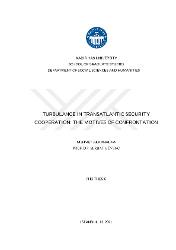| dc.contributor.advisor | Güvenç, Serhat | |
| dc.contributor.author | Alkanalka, Mehmet | |
| dc.date.accessioned | 2023-10-17T20:46:24Z | |
| dc.date.available | 2023-10-17T20:46:24Z | |
| dc.date.issued | 2021 | |
| dc.identifier.uri | https://tez.yok.gov.tr/UlusalTezMerkezi/TezGoster?key=5XiSE4yCP_gmnukpMEp65UxKmtDw_0BMd5ZnZ98Uu3OwI0s5fpt4clg3qI56YOvX | |
| dc.identifier.uri | https://hdl.handle.net/20.500.12469/4552 | |
| dc.description.abstract | Tez kapsamında, Transatlantik Güvenlik mimarisindeki çatışmaların ardındaki nedenler analiz edilecektir. Öncelikle, başlıca aktörlerin tehdit algısı, ardından değişen güvenlik yapısı anlaşılmalıdır. Bu amaçla, 2000-2019 zaman aralığında ABD, Fransa ve Almanya'nın stratejik dokümanları üzerinde karşılaştırmalı bir vaka incelemesi gerçekleştirilmiştir. Bu tez kapsamında; incelediğimiz üç devletin dokümanları söz konusu aktörlerin tehdit algısı, ittifaktaki duruşları ve savunma stratejilerine dair somut verileri ortaya koymaktadır. Güç dengesi ile tehdit dengesi kavramları, tez çalışması kapsamında birlikte ele alınan kilit realist kavramlardandır. Güç dengesi teorisini benimseyen devletler, güç dağıtımını dikkate alarak dengeleme yapmak suretiyle hedeflerine ulaşırken; tehdit dengesi kavramını dikkate alan devletler güçten ziyade tehditleri dengeler. Söz konusu üç aktörün tehdit tanımları örtüşmemektedir. Transatlantik İttifakını sürdürmek için, Fransa ile Almanya'nın güvenlik tercihleri eskisi kadar olmasa da, çok taraflı iletişim stratejilerine ve Transatlantik İttifakı içerisinde yeni çıkar ve nüfuz alanlarına ihtiyaç duydukları çıkarımında bulunulabilir. Bu çalışmanın ana hipotezi şu şekilde özetlenebilir: küresel güç yapısı ve dağıtımı, ABD ve Avrupa Kıtasındaki İki Güç olan Fransa ile Almanya'yı birlikte hareket etmeye yöneltmektedir. Bu tezin başlıca bulgularından birisi; ABD'nin realist okumadan uzak hareket ettiği ve Almanya ile Fransa'nın daha realist bir yol izlediğidir. Stratejik tehdit varsayımlarına dair aksiyonların hiçbir zaman kutsal ve değişmez olmadığı, aksine sürekli değiştiği sonucuna varılabilir. | en_US |
| dc.description.abstract | This dissertation analyzes the motives of the confrontation in the Transatlantic Security architecture. First of all, the threat construction of the main actors must be understood, and subsequently the altered security landscape. To this end, a comparative case study was conducted on the strategic documents of the U.S., France and Germany within the time scope of 2000-2019. The documents of three states analyzed in this dissertation yield tangible data on the actors' threat perceptions, and their positions in the Alliance, and defense strategies. The balance of power and the balance of threat are two key realist concepts examined in this dissertation. The states assuming the balance of power theory reach their goals by balancing, taking distribution of power into consideration, while the states embracing the balance of threat concept balance the threats rather than power. The threat definitions of the three actors in question do not overlap. It might be deduced that although the security preferences of France and Germany are not how they used to be, they still need multilateral communication strategies and new areas of interest and influence in the Transatlantic Alliance in order to perpetuate the Alliance. The main hypothesis of this work could be summarized as follows: the global power structure and distribution lead the U.S. and the two major European Powers -France and Germany- to act together. One of this dissertation's principal findings is that the U.S. acts unrealistically while Germany and France choose a more realistic path. It could be concluded that actions concerning strategic threat assessments have never been sacred and set in stone and have always been changing. | en_US |
| dc.language.iso | eng | en_US |
| dc.publisher | Kadir Has Üniversitesi | en_US |
| dc.rights | info:eu-repo/semantics/openAccess | en_US |
| dc.subject | Uluslararası İlişkiler | en_US |
| dc.subject | International Relations | en_US |
| dc.title | Turbulance in transatlantic security cooperation: The motives of confrontation | en_US |
| dc.title.alternative | Transatlantik güvenliği işbirliğinde türbülans çatışmanın ardındaki nedenler | en_US |
| dc.type | doctoralThesis | en_US |
| dc.identifier.startpage | 1 | en_US |
| dc.identifier.endpage | 223 | en_US |
| dc.department | Enstitüler, Lisansüstü Eğitim Enstitüsü, Sosyal ve Beşeri Bilimler Ana Bilim Dalı | en_US |
| dc.institutionauthor | Alkanalka, Mehmet | |
| dc.relation.publicationcategory | Tez | en_US |
| dc.identifier.yoktezid | 717980 | en_US |
| dc.khas | 20231017-Tez | rn_US |
















